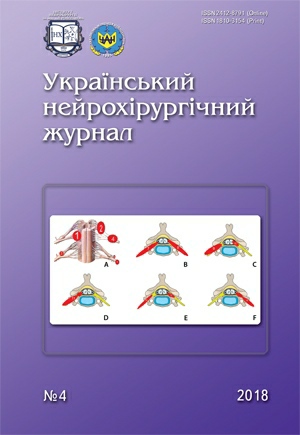Outcomes of surgical treatment of patients with infratentorial metastatic tumors
DOI:
https://doi.org/10.25305/unj.144255Keywords:
infratentorial metastases, occlusion, CSF flowAbstract
Objective. To determine the indications for surgical intervention and treatment tactic for metastatic infratentorial tumors.
Materials and methods. The study included 162 patients with metastatic tumors of the infratentorial location treated from 1995 to 2018. One hundred and two patients (79.7 %) underwent total removal along the perifocal zone of tumor growth, 9 (7 %) — subtotal removal and 8 (6.3 %) — partial removal. In 5 (3.9 %) patients tumor removal was combined with CSF-shunting; in 4 (3.1 %) cases, surgical assistance was limited to the installation of a CSF-shunt system.
Results. The most frequent sources of metastasis to the posterior cranial fossa were lungs — 42 (32.8 %) patients, the mammary gland — 19 (14.8 %) and melanoma — 15 (11.7 %). A separate large group consisted of patients with unknown primary focus (32 patients, 25 %).
Out of 43 patients with known catamnesis there were 37 (86 %) patients with solitary metastases and 6 (14 %) persons with multiple metastases (including supra-infratentorial). The average survival after surgery in patients with solitary metastases was 8.4 ± 1.5 months, with multiple (including sub-supratentorial) 5.1 ± 0.8 months. Survival more than 1 year was observed in 13 (30.2 %) patients (1 patient (2.3 %) with multiple metastases).
Conclusions. Patients with infratentorial metastases as well as with multiple metastatic brain lesions should be considered for surgery even if KPS < 70, especially due to CSF obstruction. Posterior fossa decompression with CSF flow restoration leads to survival prolongation, patients condition improvement and affords for further radiotherapy, chemotherapy or radiosurgery.
References
1. Davis FG, Dolecek TA, McCarthy BJ, Villano JL. Toward determining the lifetime occurrence of metastatic brain tumors estimated from 2007 United States cancer incidence data. Neuro Oncol. 2012 Sep;14(9):1171-7. [CrossRef] [PubMed] [PubMed Central]
2. Sperduto PW, Chao ST, Sneed PK, Luo X, Suh J, Roberge D, Bhatt A, Jensen AW, Brown PD, Shih H, Kirkpatrick J, Schwer A, Gaspar LE, Fiveash JB, Chiang V, Knisely J, Sperduto CM, Mehta M. Diagnosis-specific prognostic factors, indexes, and treatment outcomes for patients with newly diagnosed brain metastases: a multi-institutional analysis of 4,259 patients. Int J Radiat Oncol Biol Phys. 2010 Jul 1;77(3):655-61. [CrossRef] [PubMed]
3. Vogelbaum MA, Suh JH. Resectable brain metastases. J Clin Oncol. 2006 Mar;24(8):1289-94. [CrossRef] [PubMed]
4. Patel AJ, Suki D, Hatiboglu MA, Rao VY, Fox BD, Sawaya R. Impact of surgical methodology on the complication rate and functional outcome of patients with a single brain metastasis. J Neurosurg. 2015 May;122(5):1132-43. [CrossRef] [PubMed]
5. Pollock BE, Brown PD, Foote RL, Stafford SL, Schomberg PJ. Properly selected patients with multiple brain metastases may benefit from aggressive treatment of their intracranial disease. J Neurooncol. 2003 Jan;61(1):73-80. [CrossRef] [PubMed]
6. Wroński M, Arbit E, Burt M, Galicich JH. Survival after surgical treatment of brain metastases from lung cancer: a follow-up study of 231 patients treated between 1976 and 1991. J Neurosurg. 1995 Oct;83(4):605-16. [CrossRef] [PubMed]
7. Wroński M, Arbit E. Surgical treatment of brain metastases from melanoma: a retrospective study of 91 patients. J Neurosurg. 2000 Jul;93(1):9-18. [CrossRef] [PubMed]
8. Iwadate Y, Namba H, Yamaura A. Significance of surgical resection for the treatment of multiple brain metastases. Anticancer Res. 2000 Jan-Feb;20(1B):573-7. [PubMed]
9. Muacevic A, Wowra B, Siefert A, Tonn JC, Steiger HJ, Kreth FW. Microsurgery plus whole brain irradiation versus Gamma Knife surgery alone for treatment of single metastases to the brain: a randomized controlled multicentre phase III trial. J Neurooncol. 2008 May;87(3):299-307. Epub 2007 Dec 22. [CrossRef] [PubMed]
10. Kanner AA, Suh JH, Siomin VE, Lee SY, Barnett GH, Vogelbaum MA. Posterior fossa metastases: aggressive treatment improves survival. Stereotact Funct Neurosurg. 2003;81(1-4):18-23. [CrossRef] [PubMed]
11. Nayak L, Lee E, Wen P. Epidemiology of brain metastases. Curr Oncol Rep. 2012 Feb;14(1):48-54. [CrossRef] [PubMed]
12. Zhang X, Zhang W, Cao WD, Cheng G, Liu B, Cheng J. A review of current management of brain metastases. Ann Surg Oncol. 2012 Mar;19(3):1043-50. [CrossRef] [PubMed]
Downloads
Published
How to Cite
Issue
Section
License
Copyright (c) 2018 Yuriy P. Zozulya, Volodymyr O. Fedirko, Viktor V. Gudkov, Dmytro V. Kubriak, Oleksandr M. Lisyanyi, Petro M. Onishchenko, Andrii G. Naboichenko, Tetyana M. Pushkaryova, Mariya Yu. Yakovenko

This work is licensed under a Creative Commons Attribution 4.0 International License.
Ukrainian Neurosurgical Journal abides by the CREATIVE COMMONS copyright rights and permissions for open access journals.
Authors, who are published in this Journal, agree to the following conditions:
1. The authors reserve the right to authorship of the work and pass the first publication right of this work to the Journal under the terms of Creative Commons Attribution License, which allows others to freely distribute the published research with the obligatory reference to the authors of the original work and the first publication of the work in this Journal.
2. The authors have the right to conclude separate supplement agreements that relate to non-exclusive work distribution in the form of which it has been published by the Journal (for example, to upload the work to the online storage of the Journal or publish it as part of a monograph), provided that the reference to the first publication of the work in this Journal is included.









